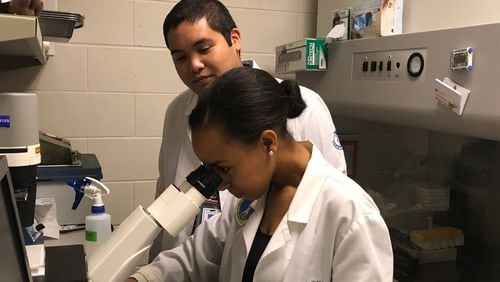Educators at several Georgia colleges and universities are increasingly fearful that federal funding for research, currently topping $1.2 billion a year, may be significantly cut under President Trump’s proposed budget, which they say could force widespread layoffs, disrupt some research and curtail training.
The presidents of eight of the state's most influential research institutions, most of them in metro Atlanta, wrote a letter last month to former Georgia congressman Tom Price, now the nation's Health & Human Services Secretary, warning him of the potential impact of some cuts to the National Institutes of Health and other biomedical research awards.
“The proposed cap would result in the discontinuance of significant portions of the federal research activities currently conducted at our institutions,” the letter read. “This includes the termination of promising research programs ranging from cancer to infectious disease, closure of several state-of-the-art research facilities, reduction of graduate and post-graduate training programs, and potentially large-scale layoffs.”
The potential cuts come as elected officials nationwide, including Trump, talk about the need to enhance cybersecurity capabilities, more research on life-threatening infectious diseases, and combatting opioid addiction. University of Georgia president Jere Morehead said the federal money for research “not only brings about medical advances and ensures continued safety and well-being of Americans, but also promotes innovation and assures our global leadership in the world’s economy.”
The eight campuses received over 1,110 grants from NIH, equaling more than $525 million during the most recent fiscal year, according to the letter.
Some are also worried about proposals in Washington they fear would eliminate a fund created through Obamacare to combat chronic diseases and create prevention research centers. One such center was created by the Morehouse School of Medicine to help low-income Georgians suffering from asthma, obesity or opioid addiction.
Telephone calls and emails to Price’s office weren’t returned late last week. White House officials have said their cuts are aimed at inefficiencies in the federal government. The NIH is one area the Trump administration believes it can find some money not being spent wisely. Georgia Tech president Bud Peterson, a member of the National Science Board, said discussions with Trump administration officials about the issue are continuing.
Georgia receives about $2.1 billion a year for research. The majority of that money, $1.2 billion, is federally funded, according to the Georgia Research Alliance, a nonprofit that helps universities recruit researchers and outfits laboratories. The rest of the money comes from foundations and industry sources. Over the past five years, research funding on Georgia’s campuses has increased by 20 percent, fifth in the nation over that time span, the alliance says.
The Georgia institutions doing the research are public and private, large and small. They are the University of Georgia, Georgia Tech, Morehouse School of Medicine and Augusta, Clark Atlanta, Emory, Georgia State and Mercer universities. The work, the alliance says, ranges from cybersecurity to creating better treatments for the Ebola and Zika viruses.
The proposed cuts come after some Georgia institutions have seen increases in research funding and training for students. Georgia State earlier this month reported a record $143 million in research funding, the sixth consecutive year it has exceeded the prior year's totals. The University of Georgia also reported earlier this month that investment in research and development reached a record high last fiscal year, at $458 million. Federally-funded research expenditures have increased at UGA from $132 million in fiscal year 2013 to this fiscal year's total of $159 million, university officials said.
The state's Board of Regents is scheduled to vote next month on Tech's $63 million proposal to buy additional space for its research work in Cobb County.
For now, Tech president G.P. ‘Bud’ Peterson and others are watching and waiting and trying not to worry. About half of Tech’s $1.4 billion annual budget is earmarked for research, officials say. Any cuts on the level the Trump administration has discussed would have a “substantial” impact to Tech, Peterson said.
“We’re watching very carefully what happens with federal research,” Peterson said in an interview.
The NIH awards more than $25 billion a year in research grants to more than 2,500 universities, medical schools, and other research institutions in every state and worldwide. The institute’s overall appropriations would decline by more than 20 percent under the proposed federal budget, from $34 billion to about $27 billion.
Peterson’s particularly concerned about cuts to smaller institutions. At the Morehouse School of Medicine, officials said if cuts are approved at levels being discussed, they’d have to lay off some research technicians, cut back some research and not train as many students. The impact, particularly in training, could last years.
“We’re starting to make headway in bringing that next generation along, and for these types of programs to be eliminated sets us back,” said Sandra Harris-Hooker, Morehouse School of Medicine’s executive vice dean of research and academic administration.
Some Georgia educators said they’ve heard Price is sympathetic to the concerns about the cap on facilities and administrative costs. They hope that leads the Trump administration or Congress to reconsider any cuts.
“We want to be known as a place where cutting-edge research is done,” said Susan Shows, senior vice president at the alliance. “Those grants help.”
About the Author







